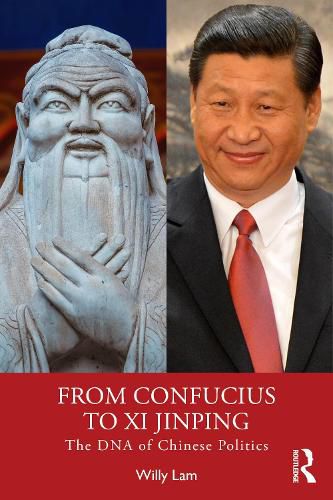Readings Newsletter
Become a Readings Member to make your shopping experience even easier.
Sign in or sign up for free!
You’re not far away from qualifying for FREE standard shipping within Australia
You’ve qualified for FREE standard shipping within Australia
The cart is loading…






This book analyzes Chinese politics, particularly the rule of Chinese Communist Party (CCP) leaders from Mao Zedong to Xi Jinping, through an examination of the country's political ideology.
This book succinctly covers the DNA of Chinese politics through the philosophies of sages in China's first liberalization period during the Warring States epoch, principally those of Confucius, Mencius, Lao Zi, Zhuang Zi, Shang Yang and Han Fei. With an appreciation of these traditional ideologies, this book displays how Chinese political philosophy (which incorporates elements of Confucianist and especially Legalist thinking) has influenced ideas and policies from as early as the Qin and Han dynasties through to the Qing dynasty and even to the current day. Highlighting the controversies revolving around the flowering and contention of beliefs and isms during China's second liberalization in the Republican Period (1912-1949), this book reveals how and why this led to the repression of the CCP era under dictators ranging from Mao Zedong to Xi Jinping.
Revealing how Chinese political and philosophical legacies impact the development of ideology and policies of CCP leadership, this book will be a valuable resource to students and scholars of Chinese politics, Chinese history, and international relations.
$9.00 standard shipping within Australia
FREE standard shipping within Australia for orders over $100.00
Express & International shipping calculated at checkout
This book analyzes Chinese politics, particularly the rule of Chinese Communist Party (CCP) leaders from Mao Zedong to Xi Jinping, through an examination of the country's political ideology.
This book succinctly covers the DNA of Chinese politics through the philosophies of sages in China's first liberalization period during the Warring States epoch, principally those of Confucius, Mencius, Lao Zi, Zhuang Zi, Shang Yang and Han Fei. With an appreciation of these traditional ideologies, this book displays how Chinese political philosophy (which incorporates elements of Confucianist and especially Legalist thinking) has influenced ideas and policies from as early as the Qin and Han dynasties through to the Qing dynasty and even to the current day. Highlighting the controversies revolving around the flowering and contention of beliefs and isms during China's second liberalization in the Republican Period (1912-1949), this book reveals how and why this led to the repression of the CCP era under dictators ranging from Mao Zedong to Xi Jinping.
Revealing how Chinese political and philosophical legacies impact the development of ideology and policies of CCP leadership, this book will be a valuable resource to students and scholars of Chinese politics, Chinese history, and international relations.